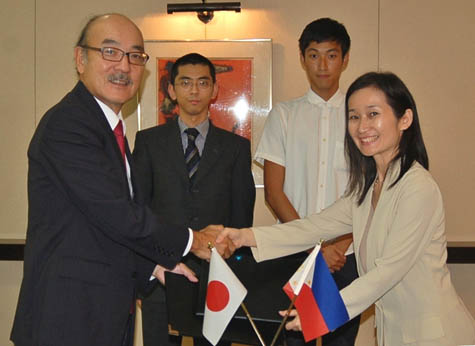
Japanese Ambassador Toshinao Urabe congratulates Country Director Yukiyo Nomura of ICAN Philippines, after signing the grant contract for “ Community Development Project with the Children of Indigenous Community in Mindanao” (Phase 2) , on February 8, 2013, at the Embassy of Japan. |
Japanese Ambassador Toshinao Urabe and Ms. Yukiyo Nomura, Country Director of ICAN Philippines signed the grant contract for the second year of the project ‘Community Development Project with the Children of Indigenous Community in Mindanao' at the Embassy of Japan on February 8, 2013 . The project, amounting to US$ 240 , 693 (approximately 9.8 million pesos), is funded by the Grant Assistance for Japanese NGO Projects, a grant funding program of Japan's Official Development Assistance (ODA).
In southern Mindanao, indigenous people such as B'laan or T'voli have kept their traditional way of life since ancient times. However, they have been forced to leave their lands and settle in higher places after the Philippine government encouraged the immigration from Luzon and Visayas to Mindanao in the 1930's. The presence of multinational companies since 1960's has also accelerated the trend. Even today, the indigenous people sometimes face discrimination, and lead a harsh living in higher lands far from urban areas. Barangay San Jose, General Santos City, which is ICAN Philippines' project site, also belongs to such areas. People in the barangay needs assistance in areas like education, health, and livelihood. It is also critical to take measures for getting rid of the sense of inferiority that the local indigenous people have long held.
As the phase 1 of the project, ICAN constructed two classrooms at the Shuttle Elementary School and equipped it with chairs, desks, and blackboards. ICAN also conducted seminars for schoolchildren and teachers to deepen their understanding on the culture of indigenous people. Health and livelihood programs were also implemented.
The phase 2 of the project will expand the achievements in the first phase. ICAN will construct two classrooms at Bia-o Primary School in the same Barangay. These schools will be furnished with desks, chairs and blackboards. The project will create an environment that is more suitable for indigenous children so that the children will accept their identity positively. In addition, the second phase will include empowerment of SPG (supreme pupil government), capacity development of teachers on the education for indigenous children, enhancement of health in community level, improvement of livelihood through production and sales of handcrafts.
The Grant Assistance for Japanese NGO Projects started in the Philippines in 2002. Since then, the Japanese Government has made contracts for 33 projects in the Philippines under the scheme, amounting to approximately 256 million pesos in total . Japan believes that this project will strengthen not only friendship between the peoples of Japan and the Philippines but also the existing strategic partnership between Japan and the Philippines.
Japanese Version
-End-


